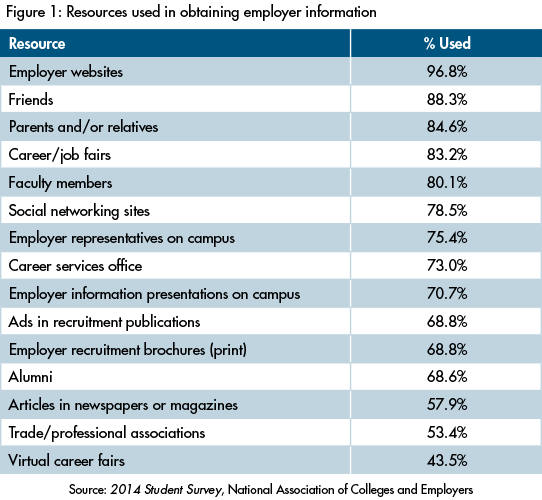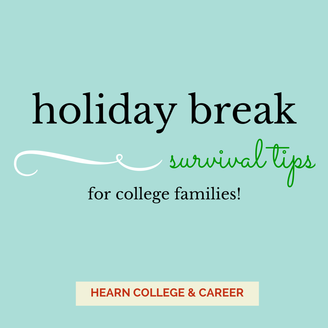|
Notice anything about the figure below? Despite all the discussion about parental (over)involvement, students remain steadfast in relying on parents and family members for career support.
So what's a parent to do when seeking to provide tools and support while encouraging full independence and accountability? The parents and students with whom I work identify three approaches to ensure student career development success: 1) Students - Start early in the academic year (now!) to clarify interests, set career goals, and connect with mentors 2) Parents - Encourage ongoing student development for long-term success with multiple plans to identify options 3) Both (Students and Parents) - Welcome professional services that can provide expert guidance and support
0 Comments
Question of the day: Our 22-year-old son is set to graduate this May with a degree in Political Science. He has not expressed any clear path he wants to take professionally. As much as we are frustrated by his lack of focus and planning, we are more worried about his future. How do we help him find a job?
I’m grateful for this parent’s permission to share her request for help. As the effects of the recovering economy linger, more and more students are finding themselves living at home and unemployed after graduation much to parent dismay. The facts support this continued pilgrimage home. Take, for example, the findings collected by the folks at Accenture, where more than 2,000 students and companies shared their perceptions of the class of 2014. When compared with the experiences of recent grads in the working world, more than 38% (or one-third) of the graduating class responded that they were planning to live at home after graduation. 42% of the graduates from 2012 and 2013 said they were also currently living at home (Accenture 2014 College Graduate Employment Survey). So what’s a weary and financially exhausted mom to do with no gainful employment for her son on the horizon? Craft resumes? Submit job applications? Collect grad school information? Cold call friends to find placement? My response is an enthusiastic YES to all of the above, as long as your student does the work. Without doing the work himself, there’s nothing to be gained enabling him in this critical process. Worst yet, you risk sending the message that he isn’t capable. Feeling torn about the college to career process and how you fit in? Consider the perspectives of employers and graduate school committees taking calls from a parent. Is this the best indicator of your student’s ability to communicate with future clients or do graduate level work? Developmentally-speaking, not all 22 year-olds arrive in the same place at the same time. Some make clearer career choices earlier while others struggle through a longer period of trial and error. Wherever your student is on the career development path, your ongoing encouragement and empathy will go a long way to helping him identify his best fit in the world. Setting expectations, encouraging short- and long-term plans, identifying potential contacts and opportunities, and encouraging him to fully utilize campus and professional resources are all appropriate ways to assist. Doing the work for him, overcompensating, defining his career objectives, or even assigning blame are all counter-productive behaviors to avoid. One last thing: In my experience, being mom (or dad) is a hard enough gig; adding career coach or college counselor to that job is very seldom a good idea. Those of us in the profession are the first ones to welcome the assistance of others beside us. If you do your (developmentally-appropriate) part and insist your son does his, success will often take care of itself. I really appreciate that you are reading my post. I regularly write about career development and college success. If you would like to read my regular posts, please visit my Facebook page and click the "like" button to follow me. You can also connect with me via Twitter, LinkedIn, and Google+. Hoping to keep the upcoming holiday break the most wonderful time of the year for you and your college student? It’s easier than you think with a little proactive communication, goodwill, and cheer. Keep everyone happy and peaceful with these quick tips to remind your student why there’s no place like home.
Expect places to be, people to see… Balancing time with family and friends during the holiday break is a test of patience and love for every family. Help your student navigate the long-awaited opportunity to reconnect with high school and hometown friends by discussing expectations for the break before it starts. Having developed and enjoyed a newfound independence at college, revisiting family routines and setting limits, including curfew, can alleviate tension and miscommunication throughout the break. … and plenty of sleep in-between. Outside of heavy socializing with family and friends, prepare for an exhausted student. Restful sleep and good nutrition may not have been plentiful these past few months, so expect a tired and hungry student eager for the comforts of home. Giving a day or two to rest and recharge can do wonders for students about to head into final exams after Thanksgiving or rebound from the semester in December. Be clear about house rules and expectations when it comes to sleeping in and staying out late. Clear communication, coupled with negotiation and compromise, will be your best bet to a peaceful holiday season. Keep it jolly and light. How’s school? Is your roommate nice? How’d you do on exams? What’s your major? The questions seem innocent enough but can feel overwhelming when students are still trying to figure things out for themselves. Declaring a major, sharing a room, and acing college exams are all rites of passage that require time and adjustment. Given that the holidays are often a rare opportunity for extended family to catch up and share, prepare to balance a plethora of questions with reassurance and support. Not only will your student appreciate the positive response but they’ll also take note of your lead to make the break a great time to unwind and relax. Be a great listener. Remember September and all of the excitement and anticipation that went along with it? Those same wonderful feelings may very well continue into the holidays but could also include some unexpected twists and turns that can derail even the most confident student. Once the initial period of excitement has worn off, it is very common for students to experience everything from bouts of homesickness and anxiety to periods of loneliness, isolation, and even mental exhaustion. For many students, the holiday break may also bring the first realization that their lives now exist between two worlds on campus and at home. Should your student confide in you feelings of homesickness or a desire not to return to school or transfer, try not to panic. Feelings of doubt and defeat can accompany the transition to college, sometimes leading students to question their college choice. Remind your student that this period of uncertainty is actually a great sign that change and growth are taking place. One last note… Students in great distress or exhibiting difficulty eating, sleeping, or maintaining relationships merit closer attention - be sure to discuss your concerns with your student if you feel something is not right. College counselors and campus resources can assist you and your student to help the college transition become a successful one. |
Categories
All
AuthorCounselor. Mentor. Dream Developer. I am a veteran college and career consultant helping clients of all ages prepare and perform for success! Archives
September 2015
|
Proudly powered by Weebly


 RSS Feed
RSS Feed